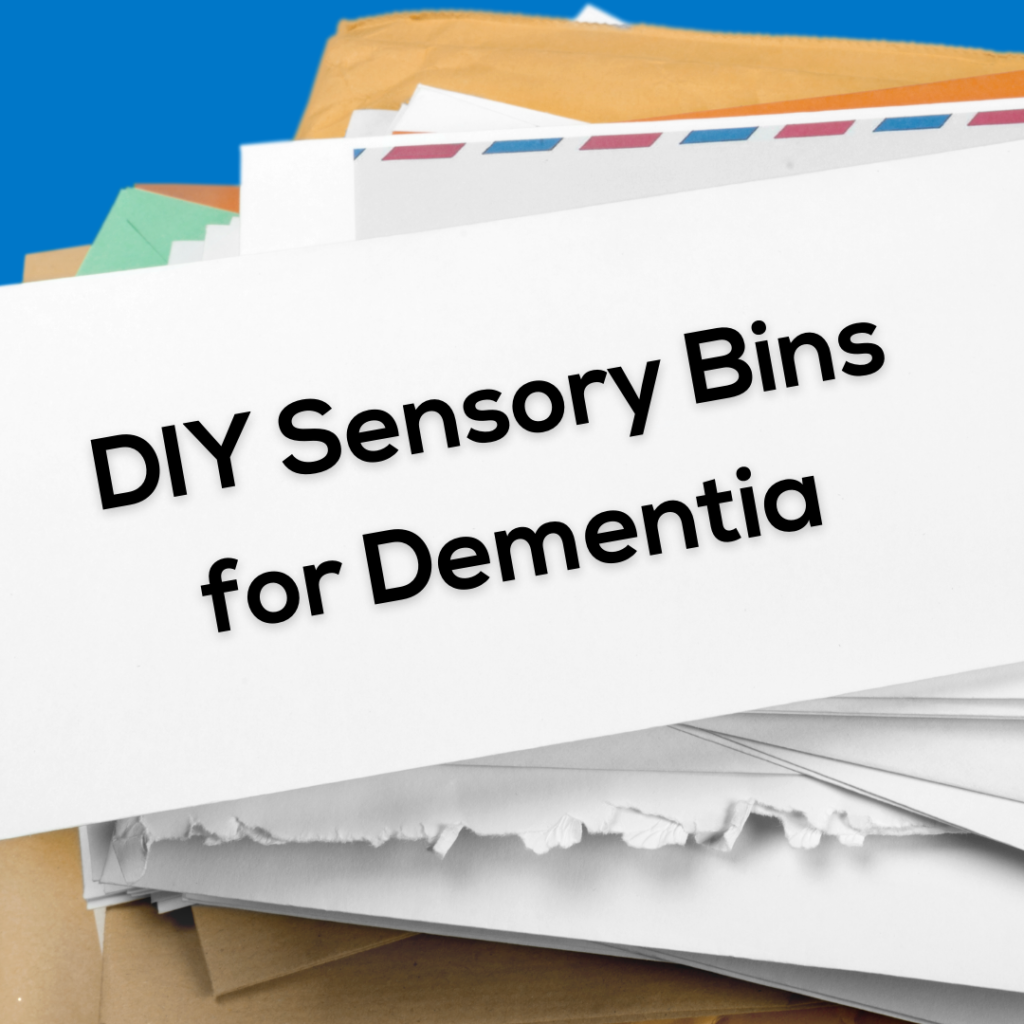Many family care partners of those living with dementia express frustration that their loved one will follow them throughout the house, making it difficult to complete necessary tasks such as paying bills, making appointments, and so on. Your loved one with dementia may find comfort in knowing where you are. In a world that is increasingly confusing to them, you are their guide. Finding meaningful activities that your loved one can safely and successfully engage in independently for a short period of time can be very helpful. One option is developing a series of Sensory Bins that can be presented to your loved one as a “project that I need help with.” Sensory Bins are easy and cost effective to create. Think of what your loved one would find important to help with. What tasks would they have previously found value in doing? Can you create a bin that would give your loved one an opportunity to participate in some way in that task? It is so easy to get caught up in the thought process of “well, they just can’t do that anymore.” It may be true that your loved one can no longer complete certain tasks on their own. However, is there a certain aspect of that task that they CAN do? By focusing on their abilities, you can create moments of success in your loved one’s day.
A few suggestions on ideas and supplies for Sensory bins are listed below. You can cater your sensory bin to your loved one’s interest and capabilities. The idea is to provide them with a meaningful task in which they can feel helpful and engaged. We all have a need and desire to contribute something of value to our family and community. This need does not stop just because someone is living with dementia. As your loved one’s care partner, you can create opportunities for success for your person living with dementia.
Home Card Bin: Collect an assortment of cards and envelopes such as Birthday, Anniversary, Get Well, Sympathy, Thank You, and New Baby cards. Make labeled dividers according to topic. Remove all cards from bin and set aside. Select two types of cards, for example, Birthday Cards and Get-Well Cards. Mix the two selected groups together. Place the mixed pile of cards in front of your loved one, along with the labeled dividers for the chosen cards. Ask your loved one for their help in organizing the cards into the correct group. You could say, “oh boy, my card bin is just so unorganized! Mom, you are just so good at organizing, could you please help me organize these? Could you please put all the Birthday cards under the Birthday divider, and all the Get-Well cards under the Get-Well divider?” Your loved one may need help to get started.
Woodworking Bin: Collect an assortment of wood pieces, bird houses, wood signs, and an assortment of differing sandpaper blocks in varying grains. Ask your loved one if they can sand a few of the objects for you. Let them know that you were thinking about making a gift for someone but need their help in preparing the wood to be painted. “I really think Sally would like this bird house in her garden. Before we can paint this bird house, I need you to sand it so it is smooth.”
Tackle Box Bin: Many husbands have a fishing tackle box that may have been put away for safety reasons years ago. However, by taking the hooks off the lures to remove the safety hazard, your loved one can still enjoy spending time rustling through the tackle box! Put in a few pictures of his “Trophy Catch” or other photos of him and his family or friends fishing.
Garden Bin: If your loved one was an avid gardener, collect an assortment of seed packets such as flowers and vegetable seed packets. Throw in a few seed catalogs and gardening magazines to look through. You can even include a small terra cotta pot, dried black beans (for dirt), and a few of their favorite silk flowers for “planting” a pot of flowers. You could ask “Dad, I really need help deciding what to plant in my garden this year. Would you please find the seed packets that you would always plant in your garden? Your gardens were always so beautiful.”
Sole Mate Bin: Who doesn’t have a basket with unmatched socks at their house? Finding the “lost sole” mates are a great activity for those living with dementia, and it’s a great help! Even if you are great at keeping your socks together, this is an easy bin to create. If you don’t feel like buying socks just for this purpose, collect socks from your drawer, separate them and throw them all into a basket. Ask your loved one to help you finish the last load of laundry by matching the socks.
With all the Sensory Boxes, you can cater the task to your loved one’s interest and ability. Be sure to praise their efforts and thank them for their help. If you have further questions on creating Sensory Bins, reach out to the Fox Valley Memory Project.
Fox Valley Memory Project
920-225-1711
[email protected]

Love this very helpful post. My Mom and I shared a love for crocheting but there were times when crocheting got to frustrating for her. She still wanted to participate and just be with me while I worked on a project. So I brought a few small skeins of yarn that I needed to have wound in balls. I asked Mom if she could help me with this task. We spent some time together, me crocheting, Mom making yarn balls and reminiscing about when we were younger and doing lots of fun things together. 🙂
What a great idea! Thank you for sharing. Sounds like the two of you enjoyed your afternoon together doing something you both liked to do, while spending precious moments by each other’s side.